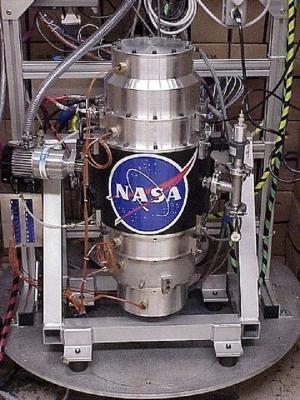Sun, Apr 13, 2014
Issues Call For Proposals For Alternative Energy Storage Devices
NASA is seeking proposals for the development of new, more capable, energy storage technologies to replace the battery technology that has long powered America's space program.

Fly wheels, such as the NASA G2 flywheel module pictured here, are one way to store rotational energy for use by spacecraft or machines on Earth. NASA’s looking for new energy storage systems to enable our future exploration missions.
The core technologies solicited in the Wednesday call for proposals will advance energy storage solutions for the space program and other government agencies, such as the Department of Energy's Advanced Research Projects Agency (ARPA-E) through ongoing collaboration with NASA and industry.
"NASA is focusing on creating new advanced technologies that could lead to entirely new approaches for the energy needs of the agency's future Earth and space missions," said Michael Gazarik, associate administrator for space technology at NASA Headquarters in Washington. "Over the next 18 months, NASA's Space Technology Mission Directorate will make significant new investments that address several high priority challenges for achieving safe and affordable deep-space exploration. One of these challenges, advanced energy storage, offers new technology solutions that will address exploration and science needs while adding in an important and substantive way to America's innovation economy."

NASA's solicitation has two category areas: "High Specific Energy System Level Concepts," which will focus on cell chemistry and system level battery technologies, such as packaging and cell integration; and, "Very High Specific Energy Devices," which will focus on energy storage technologies that can go beyond the current theoretical limits of Lithium batteries while maintaining the cycle life and safety characteristics demanded of energy storage systems used in space applications.
Proposals will be accepted from NASA centers and other government agencies, federally funded research and development centers, educational institutions, industry and nonprofit organizations. NASA expects to make approximately four awards for Phase I of the solicitation, ranging in value up to $250,000 each.
Through solicitations and grants, NASA's investments in space technology provide the transformative capabilities to enable new missions, stimulate the economy, contribute to the nation's global competitiveness, and inspire the next generation of scientists, engineers, and explorers.
(Image provided by NASA)
More News
He Attempted To Restart The Engine Three Times. On The Third Restart Attempt, He Noticed That Flames Were Coming Out From The Right Wing Near The Fuel Cap Analysis: The pilot repor>[...]
Make Sure You NEVER Miss A New Story From Aero-News Network Do you ever feel like you never see posts from a certain person or page on Facebook or Instagram? Here’s how you c>[...]
From 2009 (YouTube Edition): Leading Air Show Performers Give Their Best Advice for Newcomers On December 6th through December 9th, the Paris Las Vegas Hotel hosted over 1,500 air >[...]
Aero Linx: NASA ASRS ASRS captures confidential reports, analyzes the resulting aviation safety data, and disseminates vital information to the aviation community. The ASRS is an i>[...]
“For our inaugural Pylon Racing Seminar in Roswell, we were thrilled to certify 60 pilots across our six closed-course pylon race classes. Not only did this year’s PRS >[...]
 NTSB Final Report: Rutan Long-EZ
NTSB Final Report: Rutan Long-EZ ANN FAQ: Turn On Post Notifications
ANN FAQ: Turn On Post Notifications Classic Aero-TV: ICAS Perspectives - Advice for New Air Show Performers
Classic Aero-TV: ICAS Perspectives - Advice for New Air Show Performers ANN's Daily Aero-Linx (06.28.25)
ANN's Daily Aero-Linx (06.28.25) Aero-News: Quote of the Day (06.28.25)
Aero-News: Quote of the Day (06.28.25)




